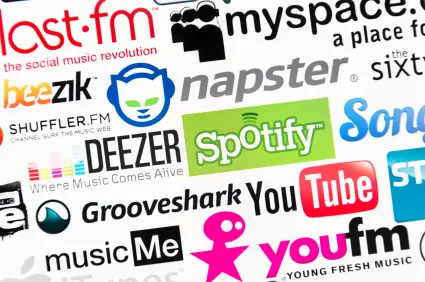
How Long Before There’s More Consolidation in the Streaming Music Sector?
Sure you’ve heard of Spotify, Apple Music, Google Play Music and YouTube. If you go one level deeper, you’ll find Tidal, Deezer and Napster. But that’s still only the tip of the iceberg of streaming music services. A quick check on Wikipedia pulls up a list 69 different streaming music services operating (or, in the case of Rdio, Milk and a few more which have disappeared) in various part of the world. That’s unsustainable.
None of the streaming music companies–NONE of them–are making money. They’re all operating at a loss. Spotify, for example, despite having 40 million subscribers, chewed through $200 million recently. Apple and Google don’t talk about their services because they’ve got plenty of money to subsidize their operations until all the dust clears. Same with Amazon, which is rumoured to be launching its own streaming division.
Clearly, we need some consolidation and an overall thinning of the herd–and, as cruel as this sounds, probably the sooner the better. But how? Variety thinks it’ll take a price war to force out the smaller players and to funnel everything towards the big boys. It’ll also clear up consumer confusion and increase adoption of the music acquisition method of the future. Here’s an excerpt:
Apple’s current cold shoulder toward Tidal is bad news for a number of competitors, including Deezer, which has enjoyed some success in France and launched in the U.S. this summer; SoundCloud, which launched its paid tier in March; and Napster, which was known as Rhapsody in the U.S. until a rebrand in June.
These services combined have fewer paying users than Apple Music. Worse, on their own, these smaller companies lack the deep pockets to compete with the big guys — especially with other well-financed players lurking in the shadows.
Amazon is said to be eyeing a separate paid plan with a catalog that’s as big as Spotify’s, but cheaper if consumers use Amazon’s Echo speakers for playback. The e-commerce giant currently offers streaming of a limited catalog of albums as a benefit to Prime subscribers.
In addition to Amazon, there’s Google, which combined music subscriptions with its ad-free YouTube service last year but has yet to put major marketing muscle behind the effort.
Samsung was first to face reality this summer, shutting down its Milk Music service. “We have made the strategic decision to invest in a partner model,” a company spokesperson told Variety at the time. Translation: Competing with the big dogs simply isn’t worth it.
Clearly, Pandora isn’t among those willing to cede the sector to the market leaders.
Read the entire article here.



But leaving it to the Big Boys will also kill competition and up prices. Look at Canada’s cellular companies and their collusion on data rates.